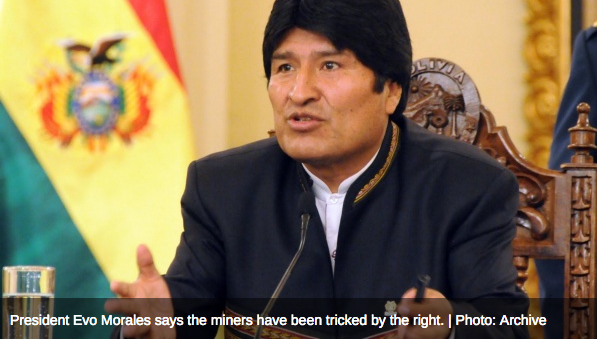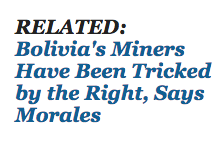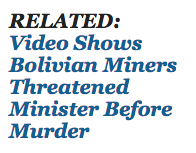
Bolivia Cracks Down on Mining Industry After Minister's Death
September 1, 2016 - telesurtv.net
Cooperative miners in Bolivia have been dealt a blow by the government after ministers decided to reverse previously agreed to concessions and establish tough new rules for the sector.
 One decree passed by the Cabinet on Thursday morning bans the cooperative miners from conducting their own business with transnational companies. "The first decree explicitly states that signed contracts of lease and sublease between the mining cooperatives with domestic or foreign private companies reverts to the domain of the state," Mining Minister Cesar Navarro said at a press conference.
One decree passed by the Cabinet on Thursday morning bans the cooperative miners from conducting their own business with transnational companies. "The first decree explicitly states that signed contracts of lease and sublease between the mining cooperatives with domestic or foreign private companies reverts to the domain of the state," Mining Minister Cesar Navarro said at a press conference.
The government estimates that there are currently 31 contracts signed with private companies for at least 25 years; in some cases the contracts are indefinite. The president of the Bolivian mining corporation, Comibol, Marcellin Quispe, claims there are just seven contracts signed between cooperative miners with private companies, both national and transnational.
Other measures passed by the government include one that gives more powers to the Mining Ministry. The state now has the authority to check and reverse licences in areas currently under the control of the mining cooperatives. "We will be able to verify hundreds of areas scattered in several departments to see if these areas have mining activity, but if there is no activity the granting of licences and administrative contracts for miners will revert to the Bolivian State," Minister Navarro said after a Cabinet meeting in La Paz.
A third decree gives the authorities the right to supervise and control cooperatives around the country. Cooperatives now have to meet a series of requirements to justify their business operations, such as providing information on the volume and value of their production, their income and how profits are distributed. Cooperatives must submit this documentation by Jan. 31, 2017. In addition, the government is requesting balance sheets, details of management structures and up-to-date rosters of partners and administrative staff. If any cooperative does not comply the company will automatically lose its status as a private enterprise.
 The use of dynamite has also been outlawed in public demonstrations. A law approving the use of dynamite in protests was approved on Labor Day but has been reversed after miners attacked police with dynamite during recent blockades. Anyone found with dynamite in public could face between a sentence of up to four years in prison.
The use of dynamite has also been outlawed in public demonstrations. A law approving the use of dynamite in protests was approved on Labor Day but has been reversed after miners attacked police with dynamite during recent blockades. Anyone found with dynamite in public could face between a sentence of up to four years in prison.
The government says the aim of the new legislation is allow "real" mining cooperatives to develop their activities in the framework of the new mining law. However, those "camouflaged" as mining cooperatives which are just "companies exploiting men and women" will have their licences revoked according to authorities.
The Minister for Labor Gonzalo Trigoso also announced the guarantee of worker rights of all workers serving in cooperatives. "From today these citizens are under the protection of labor legislation and the right to unionize is in full force," Trigoso said.
The announcement comes a week after violent blockades by miners, which claimed the lives of five miners and former Deputy Minister of the Interior Rodolfo Illanes.
President Evo Morales revealed to teleSUR that Illanes was tortured for six hours by miners before he was murdered. "My colleagues told me that Deputy Minister Illanes suffered more than Christ," Morales said.